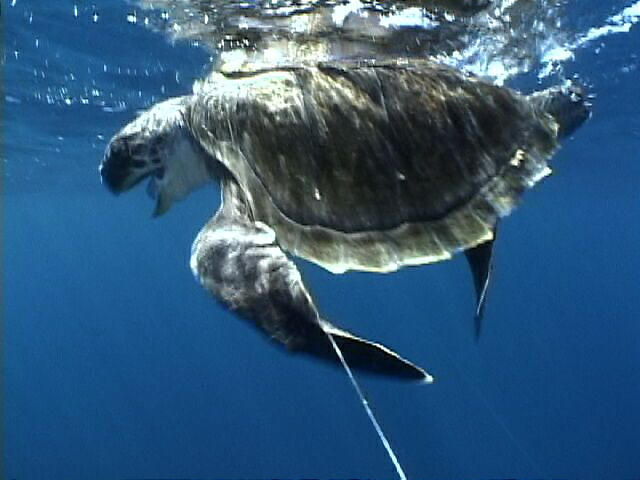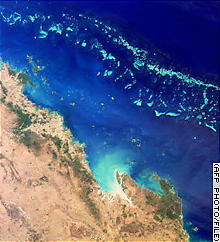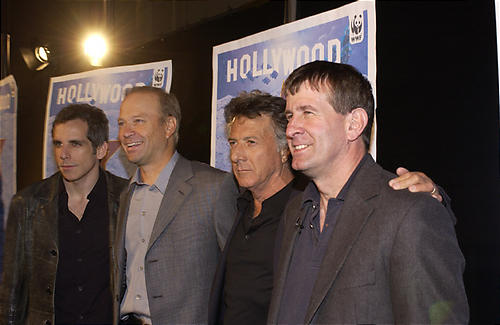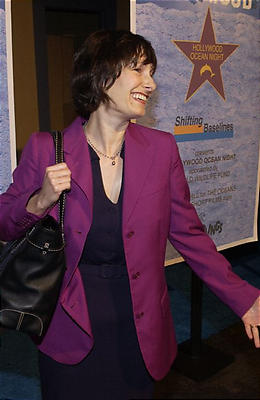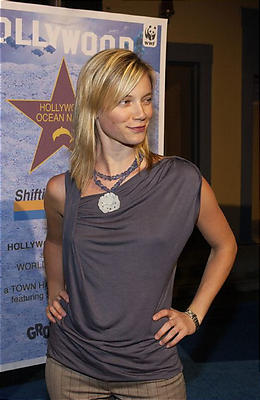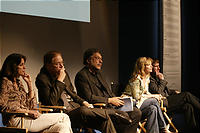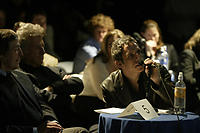March 31, 2004
Turtles 2, Fishermen 1
Let's keep score. Last week (March 14) the U.S. announced it was
banning longline fishing in the waters between California and Hawaii
(one for the turtles). Then the Senate passed a bill on marine turtle
conservation (two for the turtles). But now National Marine Fisheries
Service says it will end its annual April/May ban on longline fishing
in the huge region south of Hawaii (one for the fishermen).
Does anybody find keeping track of fisheries news complicated?
The Lovely Blue-green Shore of Nauru (at least from the air)
"The shoreline of the Pacific isle of Nauru, for example, appears blue-green in aerial photos, not from coral reefs, but from mounds of discarded beer cans, UNEP said."
More on islands and garbage from the UNEP summit in South Korea...
March 30, 2004
IMPORTANT: Dead zones have doubled since 1990
This is one of our major messages with SB: the United Nations Environment Program announces that the number of "dead zones" worldwide has doubled since 1990.
See more info on the UNEP site and at Yahoo! News.
Check out our Rotten Jellyfish Awards for details on the Gulf of Mexico Dead Zone.
March 29, 2004
Darwin Mounds deemed out of bounds: Scotland protects reefs
"EU Fisheries Ministers in Brussels finally agreed to give permanent protection to Scotland's unique cold-water coral reefs..." See the full story.
Ocean Emotion: Hollywood Ocean Night gets ink
(2) la.com (scroll down to March 23rd)
(3) Wireimage.com
March 28, 2004
Ocean conservation in Britain has a familiar problem: of out of sight, out of mind
"On land, people can see the impact of human activities on the environment. But at sea, pollution, damage to fish stocks, degradation of habitats and declines in biodiversity are less immediately apparent."
Relief for Great Barrier Reef: Fishing ban for 1/3
Check out the CNN piece here...
March 25, 2004
Dustin Hoffman and Ben Stiller Turn Out for Hollywood Ocean Night
“In Hollywood we are sometimes treated to advance warnings of serious issues to come,” Dustin Hoffman said at Hollywood Ocean Night. “I think this evening is our warning for what is headed our way in the oceans.”
Dustin Hoffman and Ben Stiller were the guests of honor at Hollywood Ocean Night on Monday, March 22, which was a presentation of Shifting Baselines and sponsored by one of the newest SB partner groups, World Wildlife Fund. Over 250 guests packed onto Stage 7 at Raleigh Studios in Hollywood to hear an overview of the problems in the world's oceans and some of the possible solutions. To keep the evening from getting too depressing, the audience was treated to four 2 minute comic films from The Groundlings.
The evening featured presentations by Dr. Jeremy Jackson of Scripps Institution of Oceanography, and Dr. Daniel Pauly, Director of the Fisheries Center at the University of British Columbia. Jackson is the lead scientist within the Shifting Baselines Ocean Media Project. Pauly is responsible for coining the term “shifting baselines,” in 1995.
Attendees included the heads of many SB partner groups (Roger Rufe, Director of The Ocean Conservancy, Charlie Kennel, Director of Scripps Institution of Oceanography, Mark Gold, Director of Heal the Bay, Krista Gano, Executive Director of The Groundlings) and a number of other celebrities in addition to Hoffman and Stiller such as Maya Rudolph (Saturday Night Live) and moderators Sharon Lawrence (NYPD Blue), Wendie Malick (Just Shoot Me), and Amy Smart (“Starsky and Hutch”).
The highlight of the evening was a town hall style discussion in which the audience was allowed to ask questions of Jackson and Pauly. Carl Safina, Director of Blue Ocean Institute and prominent ocean author signed copies of his books “Song for the Blue Ocean,” and “Eye of the Albatross.” Blue Ocean Institute sponsored a seafood reception with sustainable seafood prepared by chef Ben Ford. The menu included Alaskan halibut ceviche, sweet corn cake with Dungeness crab, and Sterling Caviar from farm-raised white sturgeon by Stolt Sea Farm of Sacramento, California.
Ben Stiller, Randy Olson, Dustin Hoffman, Scott Burns (WWF)
Maya Rudolph of Saturday Night Live
Amy Smart ("Starsky and Hutch," "The Butterfly Effect")
Wendie Malick, Jeremy Jackson, Daniel Pauly, Sharon Lawrence, Scott Burns
Paul Cummins, Dustin Hoffman, Ben Stiller
March 23, 2004
Return of the Lobstah
To minus forty and back (or maybe somebody's leg is being pulled).
March 19, 2004
California farmed oysters full of B.S.
Well, it's true. According to this article the oyster farmers are
complaining about bull crap being washing into the local waters of
Tomales Bay, California.
March 17, 2004
Burning Bacteria in Burris' Butt: victim of the sea or somebody's picnic?
Garry Burris is a former fisherman turned documentary filmmaker who has done a lot to help bring attention to problems in the Gulf of Mexico with this documentary, "Deep Trouble: The Gulf in Peril." His work provided much of the material for the excellent series on "The Dead Zone" in the Naples News last fall. And he was a big help to us when we did our Rotten Jellyfish Award on the dead zone.
Now he has sat on the beach, got a nasty itch on his butt, that turned into an MSRA infection, which means bacteria that are methicillin-resistant staphylococcus aureus. The question is are those bacteria that the ocean is filling up with because of its unhealthy condition, or are they just a local population due to lots of people present on that particular beach? Read more here and learn about the disagreements over MSRA levels.
March 16, 2004
The Pirates of Extinction: 100,000 albatross killed by illegal fishing
The Royal Society for the Protection of Birds says 19 of 21 species of Albatross are headed for extinction if nothing is done to curtail their losses to illegal fishing techniques.
By the way, Dr. Carl Safina, author of "The Eye of the Albatross," which last year was honored as the best book for communicating science by the National Academies of Science, Medicine, and Engineering, will be attending our Hollywood Ocean Night on March 22.
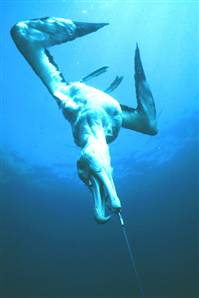
(Photo credits: Graham Robertson / Australian Antarctic Division)
March 15, 2004
Questions and Answers about SB (funding, success, value)
Q: Where does your funding come from?
This is probably the most common question we are asked. A lot of people want to help save the oceans and would love to find the funds to occasionally make funny films while doing it, so they can't help but be curious.
To begin with, almost none of the funding for this project has come from re-direction of existing ocean conservation funds. It has all come from Scripps and Ocean Conservancy donors who would otherwise have not given their funds to ocean conservation, but have been convinced that the established scientific voice of Dr. Jeremy Jackson, combined with the impeccable film credentials of Gale Anne Hurd, combined with the science and filmmaking background of Randy Olson is worthy of taking a few risks with an experiment in communications.
We now have seventeen partner groups who have joined because they support the basic ideas of what we are doing, though the funding has come only from Scripps, the Ocean Conservancy and most recently World Wildlife Fund, which is sponsoring the Groundlings films and our Hollywood Ocean Night. Also, Environmental Defense funded the Spanish translation of the website.
As flattering as it is to see people talking in chatrooms about our project and saying, "looks like somebody's spending millions on this one," (we've seen this comment at least a half dozen times) the fact is the total budget to date has been about $400,000 which has paid for the PSA campaign, the website, the lenticulars, the events we have staged, the slide show, the videos, the comedy contest, the Rotten Jellyfish Awards, our small windowless office at Raleigh Studios, and the upcoming Hollywood Ocean Night.
We've gotten a lot of mileage out of it.
Q: And is it working?
Yes. The PSA has aired over 10,000 times since its release in October, including being aired on CNN Headlines News, MTV, Discovery, and written up in USA Today and US News. It has resulted in the The Ocean Conservancy receiving over 1000 requests for the SB Action Kit. The Flash slide show has been downloaded over 40,000 times. The OpEd has been reprinted in dozens of newspapers, websites, and in two college textbooks – one on natural resource law, another a popular general writing textbook (St. Martin’s Guide to Writing, 7th edition) -- and translated into five languages.
The most important accomplishment has been the absorption of the term
"shifting baselines" into the thinking and speaking of the broad audience. A test of its spread can be seen by searching the term on Google. A search of “shifting baselines” in November, 2002, produced only a single website that mentioned it in an ecological context (an essay in the Palm Beach Fishing Club News). Today, just a year and a half later, the same search produces literally hundreds of websites linking to our website and discussing the term.
Q: What does Shifting Baselines teach?
Perhaps the biggest bonus of all is what Shifting Baselines teaches – critical thinking. This is one of the most difficult things to teach, and yet most important.
It’s like the old adage of “give a man a fish, he eats for a day, teach him to fish, he eats for life.” The same is true for environmentalism. Tell people about the problems and they will stay involved for a while. Teach them how to think critically about nature, they will figure out the problems for themselves and get involved for life.
The critical thinking SB teaches is reflected in e-mails received through the website in which people talk about their local baselines – beginning to question how things are, how they used to be, and where they might be headed. Many of these are posted in our SB STORIES feature on our website.
In some ways it's sad to urge people to ask these questions – to encourage them to question the use of the word “pristine.” We would all like to sit on a beach and revel in the idea that what we are looking at is pristine – untouched by humans. But it isn’t.
As David Helvarg wrote in his book, “Blue Frontier,” there no longer is any “blue frontier.” Humans have impacted every part of the oceans. The time has come to accept this and figure out how to stop the decline of the world’s oceans, before … before we use a cliché like “before it’s too late.” The problems are serious, so let’s get to work.
March 14, 2004
Good news, bad news, good news for turtles: Pacific sworfishing banned
The good news is the U.S. is banning longline swordfish fishing,
starting April 12, in the region from the west coast to Hawaii.
The bad news is the U.S. is responsible for only 5 percent of the
swordfish fishery.
The long term good news is this at least puts the U.S. in a better
moral position to get other countries to take action.
March 13, 2004
Comic Relief (for the reef): Some of our favorite comedy sites
Without a little humor ocean decline gets depressing. Here's where we go:
1) The Groundlings - they are THE BEST, be sure to catch their live shows when in L.A.
2) Strange songs at rathergood.com - your one stop shop for Good and Evil (crabs), these guys are unbelievably creative, go to their Crab Palette and create your own artwork in squashed crabs, only concern is that they might have peaked out with "We Love Dee Moon"
3) Naked Trucker - our neighbors at Raleigh Studios, the two video clips from Conan and Bill Maher shows take a while to download but are great
4) The Hamster - our favorite blog which does a good job of maintaining a sense of humor about it all
March 12, 2004
Peter Benchley: Sharks no longer villains
Peter Benchley wrote Jaws and the whole country went crazy in the
summer of 1975 when Spielberg brought it to the screen. But this is yet
another shifting baselines tale. The times are changing.
In this nice, short essay, Peter Benchley tells why if he wrote Jaws
today it would be a very different sort of story.
March 11, 2004
Butts on the Beach: Coastal Clean-up yields 1.6 million of them
The International Coastal Clean-up day last September, organized by The Ocean Conservancy (the founding partner of Shifting Baselines), drew on the efforts of nearly a half million people around the world to collect 8 million pounds of trash.
And the number one item ... cigarette butts. Over 1.6 million of them. Which is why Surfrider is getting ready to make a big push on their "Hold on to your Butts," campaign (when one of their guys sent me an e-mail about this last fall with "Hold on to your Butts" in the subject line I thought it was porn spam and almost deleted it). Some local L.A. beaches are talking about banning smoking just to get people to quit using the beach as their ash tray.
March 10, 2004
Don't know what you've got til it's gone: Sargasso biodiversity
One of the concerns about the loss of species is that we don't even
know how many species we have to start with -- meaning its hard to even
set baselines for biodiversity.
And now, to underscore how little we know, Craig Ventor of Human Genome
fame, reported in Science last week that in a sample of sea water in the
crystal clear, seemingly lifeless waters of the Sargasso Sea are found
at least 1800 species of organisms. Which leads him to the conclusion
that "more than 99 percent of species remain to be discovered."
March 09, 2004
Leon Panetta: The public "needs to get angry"
The U.S. Oceans Commission is about to issue it's report -- probably by
the end of this month. Here's an MSNBC piece on it which says the
report will make clear recommendations for stepped up protection of the
seas, but it's doubtful anyone in the Bush Administration will respond.
Leon Panetta, Clinton's Chief of Staff and head of the Pew Oceans
Commission, says, "It's crazy right now how these systems are managed,"
by different agencies and 60 committees in congress. But, "when the
public gets excited about something change takes place," he added. The
public, "needs to get angry," he said, "then and only then" will policy
change.
March 06, 2004
For whom the bell atolls: 50 years later
When I was six years old and we lived in Hawaii on the beach near Waikiki and my father was a colonel in the army, my parents used to have cocktail parties on the beach in our backyard with all the army couples and tiki torches and roast pig and hula dancers and then, in the middle of the night the sky would fill with all sorts of colors from an atomic bomb test in Enewetak, Bikini, or Johnston atoll. And everyone would cheer and toast like it was Fourth of July. It was 1961.
Stupid, stupid humans. Everyone so excited and blissful as atolls and people and ecosystems hundreds of miles away were callously obliterated. Over 1000 tests between 1946 and 1962. This year marks 50 years since the first really big test at Bikini Atoll. Some of the test sites are still not habitable. Here is an excellent article in the Honolulu Weekly that summarizes the sad facts.
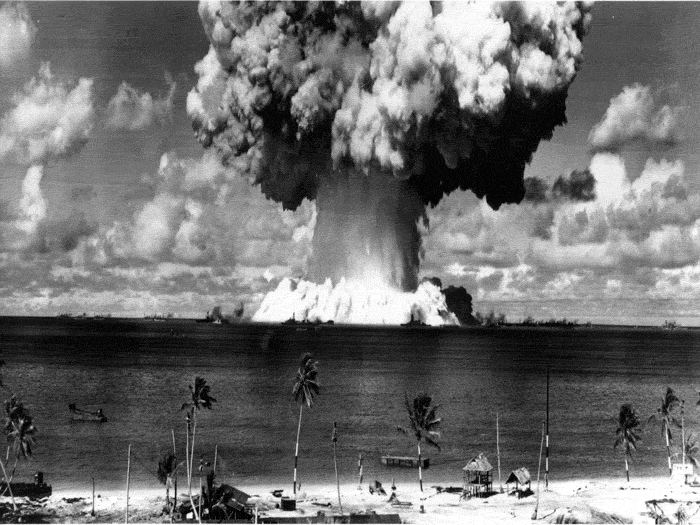
March 04, 2004
COMING SOON: Groundlings Film on Coral Bleaching
For our upcoming Hollywood Ocean Night on March 22 (details appearing soon), we are producing 4 two minute films with cast members from The Groundlings Comedy Theater. Here's a frame from one of the films, a scene in which a frustrated scientist tries to explain the warming of the oceans to these two senators who have their own "expert."
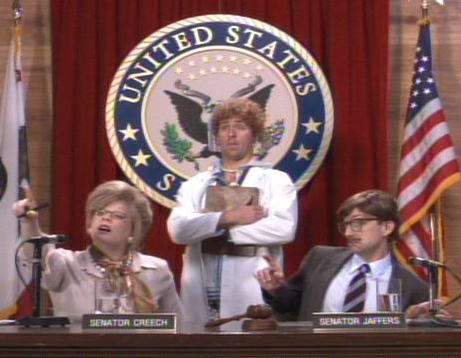
Jellyfish populations: exploding or vanishing?
This is a good article on Alaskan jellyfish populations which skyrocketed in abundance throughout the 90's, but now have crashed over the past three years. It serves to illustrate the frustration of seeking generalizations on what's happening in the world's oceans. Many of the biologists at the symposium on gelatinous zooplankton held at Dauphin Island in 2000 were of the general opinion that "jellyfish blooms" in general are increasing worldwide, but the data are not clear enough as yet to draw any firm conclusions. The reasons for the uncertainty are made clear by this article.
March 03, 2004
The Truth About Shrimp?
When I first glanced at the very excellent Seafood Mini-guide of The Blue Ocean Institute, their recommendations on various types of seafood all seemed fairly predictable until I got to the bottom of the list and did a double take. They have shrimp in their worst category. What's up with that? Well, I think for starters the Earth Island Institute can begin to tell you what's up with shrimp with their Mangrove Action Project. According to them (and many other highly knowledgeable sources) shrimp is the poster child for unsustainability. Wild caught shrimp bring with them a large amount of bycatch. And as this article tells, shrimp aquaculture is reeking havoc on the coastal regions of many developing nations -- especially in the clearing of mangroves for shrimp ponds. But is it realistic to hope Americans can stop eating shrimp when Red Lobster is currently touting their "Endless Shrimp Buffett"?
March 02, 2004
California court to fishermen: you have no right to deplete
Looks like the fishermen lost again on this one. They appealed the creation of the Channel Islands marine reserve, claiming the state constitution gives them "the absolute right to fish." Unfortunately for them the state Court of Appeals didn't see it their way, telling them they have, "no contsitutional right to deplete or destroy a fish preserve." Check out the whole story.
March 01, 2004
Great Barrier Reef: Dead by 2050?
A new report released by WWF Australia says that if temperatures continue to increase according to the predictions of the IPCC, by 2050 more than 95% of the coral will be dead.
Rediscovering the SB Wheel?
I suppose I should feel a little embarrassed. It has come to my attention that what I wrote from scratch in the fall of 2002 with my LA Times OpEd, which was reprinted in dozens of newspapers, magazines, websites and in two college textbooks so far (on general writing and natural resource law) was pretty much already written in an editorial seven years earlier (check out the editorial below). Whoops!
British scientist Dr. Charles Sheppard published the editorial titled, "The Shifting Baselines Syndrome," in Marine Pollution Bulletin, right on the heels of Daniel Pauly's paper, "Anecdotes and the shifting baselines syndrome," in Trends in Ecology and Evolution in 1995. Sheppard's editorial is right on the money and ends with an excellent last paragraph in which he hits on the fundamental problem of "what is natural," and even offers up a couple of potentially useful terms with "ecological drift," and "surrogate nature."
More importantly, I wrote to him and you can see he's a good sport about it all in his reply below. I wish I had seen his editorial earlier. Regardless, neither he nor I deserve any sort of credit for SB -- that sort of goes to Daniel Pauly, but he doesn't want much of it either, nor does Paul Dayton who published a paper around the same time with the title, "Sliding Baselines." I think what we all want is for it to simply reach as broad of an audience as possible and to be applied as much as possible. We all see the power of the term.
e-mail from Charles Sheppard:
Dear Randy,
No problem, and good to hear from you. I would be delighted to see reference to my piece on your fine website, so please do post my editorial as you suggest. It all helps...
The journal of which I am editor is Marine Pollution Bulletin, which is actually the largest purely marine environmental science journal now. This journal actually has a section called 'Baselines' which consists of a couple of papers every month on data from just about anywhere. We are naturally aware that 'baseline' is not a correct term in the sense we have been talking about (but we have carried the section for 20 years now). It is now a huge accumulation of data, dated, on which people can measure change from that date, whenever it might have been. There is another aspect of ecological shifting which is increasingly important - and that is invasive species which become 'naturalised', many unimportant, but some become dominant. That is a story by itself of course...
Best Wishes
Dr Charles Sheppard
Reader, Dept Biological Sciences.
The Shifting Baseline Syndrome
Pergamon 0025-326X(95) 00222-7
Marine Pollution Bulletin, Vol. 30, No. 12, pp. 766-767, 1995
Elsevier Science Ltd
Printed in Great Britain
0025-326X/95 $9.50 + 0.00
The shifting baseline is a phenomenon which is becoming increasingly important in many natural sciences. It happens as man changes, even subtly, the systems he is examining. It can be put like this: when we measure how much a system or an area has changed, we generally compare it with what we claim is its starting or baseline condition. That starting condition may be the condition of the same area a few years previously. More often, it may be taken to be the condition of an area around the comer which we judge to be more or less what our area of interest might have been like, or should have been like, were it not to have been impacted. The problem is that each time this is done, the control areas used may have drifted further and further away from a 'true' pre-man condition. The area around the corner may not be pristine any longer. It may be nearly pristine, but close enough to being so that the significance of any small changes is lost. Worse, each generation of scientists, or each new team of consultants brought out to do the EIA for the next development on that bit of coast, might be dealing with a 'baseline' which is drifting ever further away from its original starting point. There comes a point in this trend when the baseline area which is being used for a particular study has itself reached a condition which the original investigators of say, 25 years earlier, might have recognized as being disturbed.
Daniel Pauly (1995) who, I think, coined the phrase 'shifting baseline syndrome' refers to the same problem in fisheries. Here, every generation of fisheries experts have based their figures and referred their facts and models to the catches, landings and known biological conditions of the previous generation of fisheries scientists. He supposes that many of the present day problems in fisheries management may be caused by this and points out the importance of being able somehow to capture anecdotal information, at least qualitatively, from days long gone in the hope that this might indicate some previous condition now lost to science. However, just as Pauly says how difficult it is for modern fisheries managers to accept that centuries old fishing techniques may have had a much greater impact on world fish populations than we would like to think, so might many environmental scientists find it difficult to accept the suggestion that few areas of the world's shallow seas have not been impacted in ways which would place at least some of their work on shaky ground. If baselines are shifting, then many ecological models which relate in some way to 'natural' conditions will have been programmed with erroneous starting points. But what shallow benthic system cannot have been affected by the removal every year of hundreds of millions of tons of grazers and predators? What apparently clean coastal areas have not been affected by even modest inputs of sewage and increased land run-off, year by year, over the past 200 years? We cannot be sure, but we should at least bear the possibility in mind.
I remember reading a Cousteau book on the Red Sea many years ago, shortly after I had first dived along a large section in the centre of it. Cousteau had lamented the fact that, as he saw it, the reef condition was poorer this time than when he had first seen it shortly after World War II. I, however, had found the Red Sea wonderfully clear, warm, colourful and packed with benthic and pelagic life and found it difficult to relate to (or even believe) his depressing statements of decline. It was not expressed quantitatively which made it even more difficult to be convinced. What Cousteau had which I did not though was a 'baseline' of perhaps 20 years over which to notice change. Having now seen a lot of the Red Sea myself, including many fairly polluted and diver-damaged sites within it, I can now see a similar problem. When scientific groups appear, perhaps on an expedition or on some consultancy project, to 'monitor', 'survey' or 'do a baseline study' (all very well used phrases) several have proceeded without the slightest inkling that the reefs they are measuring have changed radically over the previous few years both trophically and dynamically. Some areas may even have shifted into a different stable state. They still look good and colourful, which disguises their changes.
Of particular concern is when scientists use such cases in areas far from their usual haunts to provide recommendations to an unsuspecting third world government. Without mentioning names, I recently worked in a coral sea where the coral reefs had been substantially killed. Mortality was obvious, coral cover was low, algal cover was high and rising, grazers had mostly all been caught and eaten. I had been preceded by two other biologists used only to algal-dominated temperate systems. Astonishingly, the massive reef disruption was not noticed by them. I learned of their work only fortuitously when giving a guest lecture to the island's Rotary Club and mentioned the killed areas, upon which a government Minister rose, visibly upset, demanding to know why my results were so wrong, compared to the much more welcome information which he had received the year before. 'You scientists can never agree on anything' was one comment, retracted (I think!) when I showed underwater photographs containing the evidence. The point is that the former scientists had only apparently ever visited damaged reef areas--such was their line of consultancy perhaps--and the semi-eutrophic condition now so prevalent was perceived by them to be a more or less normal background condition.
Most areas have no known true baseline condition and we have to accept this, but we must also recognize this in environmental work. There is unlikely to be an effective mechanism to utilize anecdotal information in a useful way. 'A great diving spot' is not easily translated into a chart of trophic structure or a table of productivity values. Yet measurements subsequently obtained from the 'great diving spot' may become, through default, measurements to which management decisions later refer. This is occurring more and more as firstly, sites which are truly unimpacted are becoming scarcer, and secondly, as the increasing number of consultants who fly all over the place to measure facets of what does exist continues to include so many who are ill informed. Using reference sites from some carefully chosen, more remote areas has been proposed (there are parallels here with the widely spread, carefully chosen sites for some new global monitoring programmes), but this idea also has its drawbacks in that, however unaffected is the condition of the chosen reference site, we might not be comparing like with like.
Is there a solution within the known ecological framework to solve this ecological problem of drift? Perhaps not, and perhaps surrogate measurements will soon be all that is available to us. We can make disappointingly few assumptions of true baseline conditions in an ecological sense for many and increasing areas of the world's shallow seas, but, using a surrogate, we always may safely assume, for example, that the natural level of PCBs in mussels is zero. Surrogate nature may, depressingly, become more and more useful to us than the real thing.
Pauly, D. (1995). Anecdotes and the shifting baseline syndrome. Trends in Ecology & Environment 10, 430.
CHARLES SHEPPARD 767
